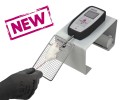Authors
S. Corrochano, M. Renna, S. Carter, N. Chrobot, R. Kent et al.
Lab
MRC Mammalian Genetics Unit, Harwell, Oxfordshire, UK.
Journal
Human Molecular genetics
Abstract
_-Synuclein and mutant huntingtin are the major constituents of the intracellular aggregates that characterize the pathology of Parkinson's disease (PD) and Huntington's disease (HD), respectively. _-Synuclein is likely to be a major contributor to PD, since overexpression of this protein resulting from genetic triplication is sufficient to cause human forms of PD. We have previously demonstrated that wild-type _-synuclein overexpression impairs macroautophagy in mammalian cells and in transgenic mice. Overexpression of human wild-type _-synuclein in cells and Drosophila models of HD worsens the disease phenotype. Here, we examined whether _-synuclein overexpression also worsens the HD phenotype in a mammalian system using two widely used N-terminal HD mouse models (R6/1 and N171-82Q). We also tested the effects of _-synuclein deletion in the same N-terminal HD mouse models, as well as assessed the effects of _-synuclein deletion on macroautophagy in mouse brains. We show that overexpression of wild-type _-synuclein in both mouse models of HD enhances the onset of tremors and has some influence on the rate of weight loss. On the other hand, _-synuclein deletion in both HD models increases autophagosome numbers and this is associated with a delayed onset of tremors and weight loss, two of the most prominent endophenotypes of the HD-like disease in mice. We have therefore established a functional link between these two aggregate-prone proteins in mammals and provide further support for the model that wild-type _-synuclein negatively regulates autophagy even at physiological levels.
BIOSEB Instruments Used:
Grip strength test (BIO-GS3)

 Pain - Thermal Allodynia / Hyperalgesia
Pain - Thermal Allodynia / Hyperalgesia Pain - Spontaneous Pain - Postural Deficit
Pain - Spontaneous Pain - Postural Deficit Pain - Mechanical Allodynia / Hyperalgesia
Pain - Mechanical Allodynia / Hyperalgesia Learning/Memory - Attention - Addiction
Learning/Memory - Attention - Addiction Physiology & Respiratory Research
Physiology & Respiratory Research
 Pain
Pain Central Nervous System (CNS)
Central Nervous System (CNS) Neurodegeneration
Neurodegeneration Sensory system
Sensory system Motor control
Motor control Mood Disorders
Mood Disorders Other disorders
Other disorders Muscular system
Muscular system Joints
Joints Metabolism
Metabolism Cross-disciplinary subjects
Cross-disciplinary subjects Preclinical studies and opioids: role in crisis management in the United States
Preclinical studies and opioids: role in crisis management in the United States 